大学英语1 第8课
- 格式:doc
- 大小:35.00 KB
- 文档页数:8

The boy was at first delighted to discover the present his mother had hidden away as his Christmas gift. But then he began to worry that his mother would now no longer have the pleasure of giving him a surprise. What was he to do?发现了母亲为他藏好的圣诞礼物男孩起先很高兴。
但接着他就开始担心,妈妈将因此失去给他一个惊喜的喜悦。
他该怎么办呢?Magician at Stretching a Dollar Russell Baker 1RT That December, with Christmas approaching, she was out at work and Doris was in the kitchen when I let myself into her bedroom one afternoon in search of a safety pin. Since her bedroom opened onto a community hallway, she kept the door locked, but needing the pin, I took the key from its hiding place, unlocked the door and stepped in. Standing against the wall was a big, black bicycle with balloon tires. I recognized it instantly. It was the same second-hand bike I'd been admiring in a Baltimore Street shop window. I'd even asked about the price. It was a shock. Something like $15. Somehow my mother had scraped together enough for a down payment and meant to surprise me with the bicycle on Christmas morning.那年的十二月,圣诞节临近了。
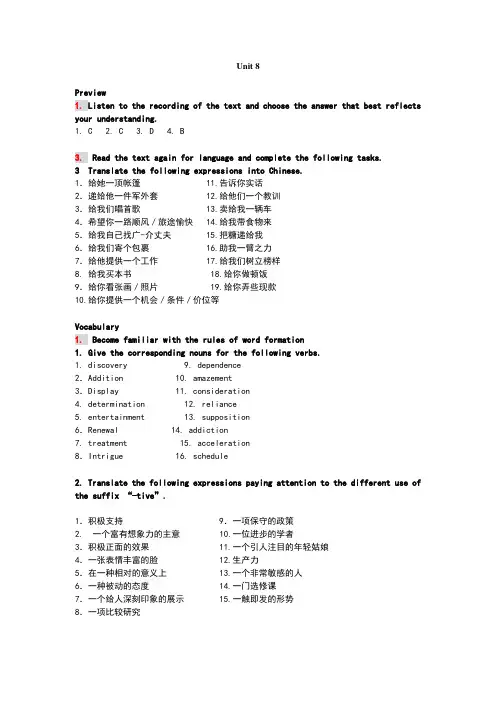
Unit 8Preview1. Listen to the recording of the text and choose the answer that best reflects your understanding.1. C2. C3. D4. B3. Read the text again for language and complete the following tasks.3 Translate the following expressions into Chinese.1.给她一顶帐篷 11.告诉你实话2.递给他一件军外套 12.给他们一个教训3.给我们唱首歌 13.卖给我一辆车4.希望你一路顺风/旅途愉快 14.给我带食物来5.给我自己找广-介丈夫 15.把糖递给我6.给我们寄个包裹 16.助我一臂之力7.给他提供一个工作 17.给我们树立榜样8. 给我买本书 18.给你做顿饭9.给你看张画/照片 19.给你弄些现款10.给你提供一个机会/条件/价位等Vocabulary1. Become familiar with the rules of word formation1. Give the corresponding nouns for the following verbs.1. discovery 9. dependence2.Addition 10. amazement3.Display 11. consideration4. determination 12. reliance5. entertainment 13. supposition6.Renewal 14. addiction7. treatment 15. acceleration8.Intrigue 16. schedule2. Translate the following expressions paying attention to the different use of the suffix “-tive”.1.积极支持 9.一项保守的政策2. 一个富有想象力的主意 10.一位进步的学者3.积极正面的效果 11.一个引人注目的年轻姑娘4.一张表情丰富的脸 12.生产力5.在一种相对的意义上 13.一个非常敏感的人6.一种被动的态度 14.一门选修课7.一个给人深刻印象的展示 15.一触即发的形势8.一项比较研究3. Give the word that refers to a person coming from that land or area1. Japanese 12. Korean2. Italian 13. Egyptian3. Brazilian 14. Portuguese4. Iranian 15. Indian5. Cantonese 16. Nepalese6. Indonesian 17. Chilean7. Cuban 18. Russian8. Vietnamese 19. Mexican9. Lebanese 20. Romanian10. Syrian 21. Sudanese11. Canadian 22 Mongolian4. Fill in the blanks with the correct form of the word “addict” or “consider”1 addicts 4 consider, consideration2 addictive, addicted 5 considerate3 addiction 6 Considerable, considered2. Complete the following verb+ noun collections or expressions1. pitch2. meal / dish / food 9. people / animals / the homeless3. guests / friends 10. people / animals4. take/ plan 11. test / develop / prove / study5 rouse / arouse 12. conquer/ feel6. faith / library books / friendship 13. make/ take/ accept / renew / withdraw7. hitch 14 nip8. drive/ travel/ cover 15 touch/ break3. Complete the sentences by translating the Chinese in the brackets.1. that all nations realize that global warming is everybody’s bushiness2. that life is always full of opportunities and challenges/risks3. that all this has proved that our efforts have not been in vain4. that the earth moves round the sun5. that she had been admitted to that university6. that wives ought to stay at home7. that the best policy is to tell people the truth8. that he mentioned the other day that9. that our teacher once said that he had noticed that some students still had difficulties with their grammar4. Turn each of the sentences into the passive voice following the example given.1. Thieves, drug addicts, rapists, and murderers are often found lurking at night in Central Park.2. The young man was left stranded in the desert.3. Can the goodwill of our fellow countrymen still be depended on?4. Wherever he went he was treated with kindness.5. He was told by the driver that he had been once robbed by a hitchhiker at knifepoint.6. Probably the tent was considered the most valuable possession in that shabby house.7. His faith in people was renewed by his experience during this trip.8. Government officials are supposed to be honest and hardworking.5. Fill in the brackets with the correct prepositions or adverbs1 for2 into3 after4 away, over5 out of6 out, into 7. to, in 8 over, out for, for 9 to, about, on, across6. Translate the following sentences into English1. The fuel/gas ran out, but he managed to make a safe landing in rice fields.2. There are already quite a few students who are considering running for the chairman of the Students’ Union.3. That student who was run over by the horse carriage is now out of danger. I consider him really lucky.4. It is said that this well has never run dry in the past hundreds of years, and this has been considered a miracle.5. We are running short of hands. You have just come in the right time.6. I’d rather have some of our public works run by the state than by private businesses.7. She warned me not to make friends with those who are always running after name and money.8. We warned them that what they did was against/a violation of the agreement/contract, and we would take legal action.7. Fill in the blanks with the correct word(s) in the brackets. More than one word may be correct.1 remember/memorize2 remember/recall3 remember/recall4 remember, special5 middle6 center7 however, visits 8 special, trip 9 particular, tour 10 found, found outGrammar1. Combine each pair of sentences following the patterns below.1. Walking along the canal, you will find new houses have sprung up on both sides.2. The young fans rushed to see their favorite star, shouting his name.3. Seeing that Jim was hard at work, the manager changed her mind and left quietly.4. The pop star stood on the balcony of his hotel room, waving to his fans.5. Being the eldest of five children, Ted dropped out of high school to help supporthis family.6. The boy sat at his computer for an hour, downloading some music off the Internet.7. The man traveled from coast to coast without money, relying entirely on the kindness of strangers.8. Realizing they belonged to different worlds, the two of them decided to go their separate ways.9. On her first night at college, Laura lay awake, thinking about the four years ahead.10. The journalist listened to the speeches at the debate, wondering whether anywhat-clause.1. What farmers what most2. what they suggested3. what my parents said to me4. what they were trying to do5. what life was all about6. what they should get out of college7. what we need8. what you look like9. what the village had achieved in the past 30 years10. what the federal government should not do at the moment3. Translate the sentences using a what-clause or a present participle phrase.1. Do what you like without caring about what other people think.(what-clause as object)2. We should find out what the students think about the matter.(what-clause as object)3. We’ll do what we can to help the earthquake victims.(what-clause as object)4. I hope what I have written will be of help to other college students.(what-clause as subject)5. Being journalism majors, we ought to keep ourselves informed of what is happening around the world.(present participle phrase as adverbial of reason, what-clause as object)6. “Stop thief!” a student called, raising his voice.(present participle phrase describing simultaneous events)7. Having nothing more interesting to do, the boy decided to take his alarm clock apart.(present participle phrase as adverbial of reason)8. Wang Lan opened the wardrobe, wondering what she should wear to the interview the next day. (present participle phrase describing simultaneous events)9. The village head went from door to door telling people to leave for a nearby hill. (present participle phrase describing simultaneous events)10. Realizing he’d been deceived, the o ld man reported the painful experience to the police.(present participle phrase as adverbial of reason)4. Fill in each blank of the passage with one suitable word.1 easy2 away3 them4 running5 However6 change7 exercise8 can9 anyone 10 that5 Identify and correct the mistake(s) in each of the sentence.1. Shortly after the Spring Festival, he returned to Beijing to prepare for a job interview.2. I don’t like the way some young people speak to their elders/people older than themselves.3. It was in high school that Tommy first/ for the first time realized he was different from his peers.4. Turning the corner of the street, we found a new duck restaurant there. / As we turned the corner of the street, a new duck restaurant came into view.5. What they need most at the moment is encouragement, not merely financial support.6. Making a presentation in English for the first time, I was so nervous that my knees kept shaking. / When I was making a presentation in English fore the first time, I was so nervous that my knees kept shaking.7. Being a spoiled child, Jim is rarely popular with other children.8. While training for the school sports meet, Linda ran at least five kilometers every day.9. He wrote to inform us that he was leaving for India next Friday.10. Knowing Grandma had heart trouble, Dad broke the bad news gently. / As he knew Grandma had heart trouble, Dad broke the bad news gently.。
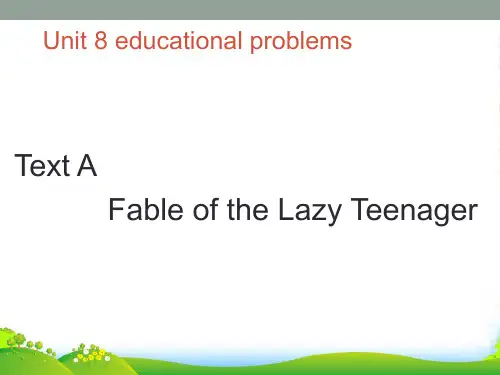
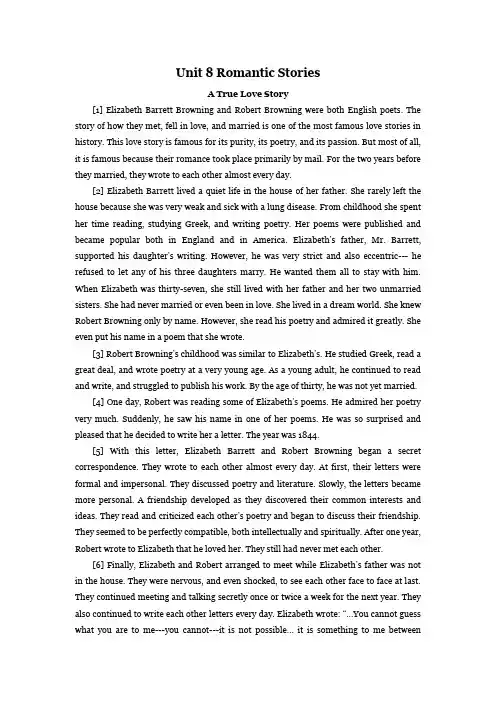
Unit 8 Romantic StoriesA True Love Story[1] Elizabeth Barrett Browning and Robert Browning were both English poets. The story of how they met, fell in love, and married is one of the most famous love stories in history. This love story is famous for its purity, its poetry, and its passion. But most of all, it is famous because their romance took place primarily by mail. For the two years before they married, they wrote to each other almost every day.[2] Elizabeth Barrett lived a quiet life in the house of her father. She rarely left the house because she was very weak and sick with a lung disease. From childhood she spent her time reading, studying Greek, and writing poetry. Her poems were published and became popular both in England and in America. Eli zabeth’s father, Mr. Barrett, supported his daughter’s writing. However, he was very strict and also eccentric--- he refused to let any of his three daughters marry. He wanted them all to stay with him. When Elizabeth was thirty-seven, she still lived with her father and her two unmarried sisters. She had never married or even been in love. She lived in a dream world. She knew Robert Browning only by name. However, she read his poetry and admired it greatly. She even put his name in a poem that she wrote.[3] Robert Browning’s childhood was similar to Elizabeth’s. He studied Greek, read a great deal, and wrote poetry at a very young age. As a young adult, he continued to read and write, and struggled to publish his work. By the age of thirty, he was not yet married.[4] One day, Robert was reading some of Elizabeth’s poems. He admired her poetry very much. Suddenly, he saw his name in one of her poems. He was so surprised and pleased that he decided to write her a letter. The year was 1844.[5] With this letter, Elizabeth Barrett and Robert Browning began a secret correspondence. They wrote to each other almost every day. At first, their letters were formal and impersonal. They discussed poetry and literature. Slowly, the letters became more personal. A friendship developed as they discovered their common interests and ideas. They read and criticized each other’s poetry and began to discuss their friendship. They seemed to be perfectly compatible, both intellectually and spiritually. After one year, Robert wrote to Elizabeth that he loved her. They still had never met each other.[6] Finally, Elizabeth and Robert arranged to meet while Elizabeth’s father was not in the house. They were nervous, and even shocked, to see each other face to face at last. They continued meeting and talking secretly once or twice a week for the next year. They also continued to write each other letters every day. Elizabeth wrote: “…You cannot guess what you are to me---you cannot---it is not possible… it is something to me betweendream and miracle.” Robert answered that he had never kept a journal before, but he had started one now. In it he wrote the date of every visit with her and how long it lasted. He even wrote the number of minutes they had been together and said that they added up to two full days in length.[7] Then, in September, 1846, in a secret marriage ceremony, Elizabeth Barrett became Elizabeth Barrett Browning. A week later, without telling Elizabeth’s father, the happy couple eloped to Italy. The shock was terrible for Mr. Barrett, but his anger could not diminish their happiness. In 1849, they succeeded in having a son. They lived in Italy, extremely happy, for fifteen years, until Elizabeth’s death in 1861.一个真实的爱情故事1 伊丽莎白·巴雷特·勃郎宁和罗伯特·勃郎宁都是英国诗人。
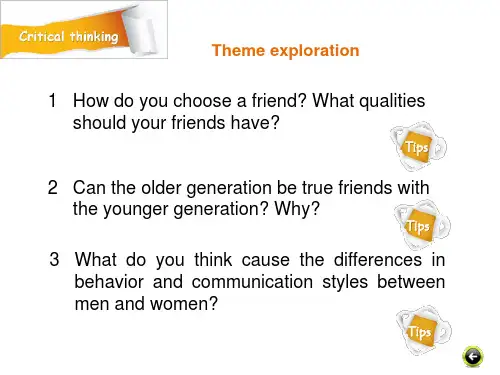
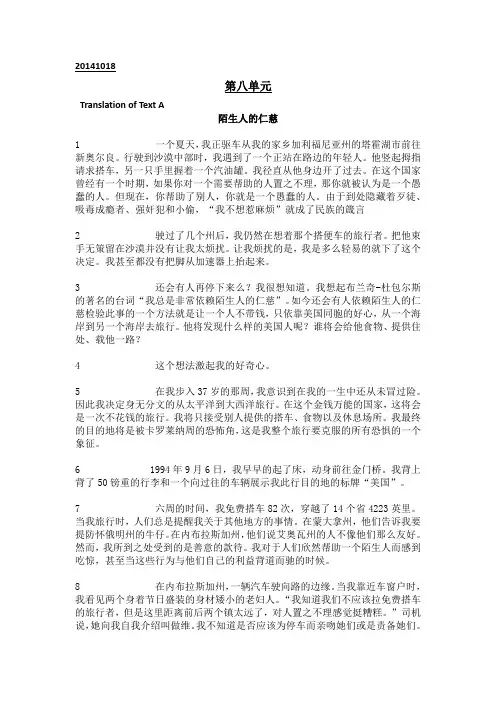
20141018第八单元Translation of Text A陌生人的仁慈1 一个夏天,我正驱车从我的家乡加利福尼亚州的塔霍湖市前往新奥尔良。
行驶到沙漠中部时,我遇到了一个正站在路边的年轻人。
他竖起拇指请求搭车,另一只手里握着一个汽油罐。
我径直从他身边开了过去。
在这个国家曾经有一个时期,如果你对一个需要帮助的人置之不理,那你就被认为是一个愚蠢的人。
但现在,你帮助了别人,你就是一个愚蠢的人。
由于到处隐藏着歹徒、吸毒成瘾者、强奸犯和小偷,“我不想惹麻烦”就成了民族的箴言2 驶过了几个州后,我仍然在想着那个搭便车的旅行者。
把他束手无策留在沙漠并没有让我太烦扰。
让我烦扰的是,我是多么轻易的就下了这个决定。
我甚至都没有把脚从加速器上抬起来。
3 还会有人再停下来么?我很想知道。
我想起布兰奇-杜包尔斯的著名的台词“我总是非常依赖陌生人的仁慈”。
如今还会有人依赖陌生人的仁慈检验此事的一个方法就是让一个人不带钱,只依靠美国同胞的好心,从一个海岸到另一个海岸去旅行。
他将发现什么样的美国人呢?谁将会给他食物、提供住处、载他一路?4 这个想法激起我的好奇心。
5 在我步入37岁的那周,我意识到在我的一生中还从未冒过险。
因此我决定身无分文的从太平洋到大西洋旅行。
在这个金钱万能的国家,这将会是一次不花钱的旅行。
我将只接受别人提供的搭车、食物以及休息场所。
我最终的目的地将是被卡罗莱纳周的恐怖角,这是我整个旅行要克服的所有恐惧的一个象征。
6 1994年9月6日,我早早的起了床,动身前往金门桥。
我背上背了50镑重的行李和一个向过往的车辆展示我此行目的地的标牌“美国”。
7 六周的时间,我免费搭车82次,穿越了14个省4223英里。
当我旅行时,人们总是提醒我关于其他地方的事情。
在蒙大拿州,他们告诉我要提防怀俄明州的牛仔。
在内布拉斯加州,他们说艾奥瓦州的人不像他们那么友好。
然而,我所到之处受到的是善意的款待。
我对于人们欣然帮助一个陌生人而感到吃惊,甚至当这些行为与他们自己的利益背道而驰的时候。
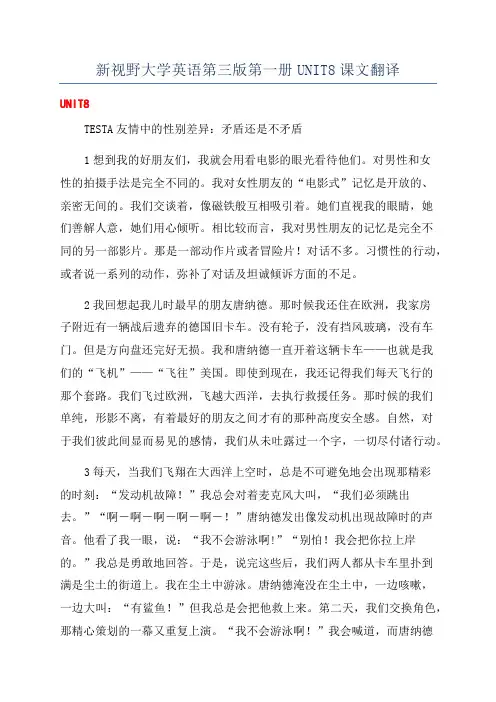
新视野大学英语第三版第一册UNIT8课文翻译UNIT8TESTA友情中的性别差异:矛盾还是不矛盾1想到我的好朋友们,我就会用看电影的眼光看待他们。
对男性和女性的拍摄手法是完全不同的。
我对女性朋友的“电影式”记忆是开放的、亲密无间的。
我们交谈着,像磁铁般互相吸引着。
她们直视我的眼睛,她们善解人意,她们用心倾听。
相比较而言,我对男性朋友的记忆是完全不同的另一部影片。
那是一部动作片或者冒险片!对话不多。
习惯性的行动,或者说一系列的动作,弥补了对话及坦诚倾诉方面的不足。
2我回想起我儿时最早的朋友唐纳德。
那时候我还住在欧洲,我家房子附近有一辆战后遗弃的德国旧卡车。
没有轮子,没有挡风玻璃,没有车门。
但是方向盘还完好无损。
我和唐纳德一直开着这辆卡车——也就是我们的“飞机”——“飞往”美国。
即使到现在,我还记得我们每天飞行的那个套路。
我们飞过欧洲,飞越大西洋,去执行救援任务。
那时候的我们单纯,形影不离,有着最好的朋友之间才有的那种高度安全感。
自然,对于我们彼此间显而易见的感情,我们从未吐露过一个字,一切尽付诸行动。
3每天,当我们飞翔在大西洋上空时,总是不可避免地会出现那精彩的时刻:“发动机故障!”我总会对着麦克风大叫,“我们必须跳出去。
”“啊-啊-啊-啊-啊-!”唐纳德发出像发动机出现故障时的声音。
他看了我一眼,说:“我不会游泳啊!”“别怕!我会把你拉上岸的。
”我总是勇敢地回答。
于是,说完这些后,我们两人都从卡车里扑到满是尘土的街道上。
我在尘土中游泳。
唐纳德淹没在尘土中,一边咳嗽,一边大叫:“有鲨鱼!”但我总是会把他救上来。
第二天,我们交换角色,那精心策划的一幕又重复上演。
“我不会游泳啊!”我会喊道,而唐纳德就会来救我。
我俩数百次地把对方从必死的境地中救出,直到最终有一天我家真的要去美国了。
我和唐纳德在火车站呆呆地站着,准备道别。
我们不知道该说些什么,这次我们谁也救不了谁。
于是,当火车驶离时,我俩只是默默地流泪。
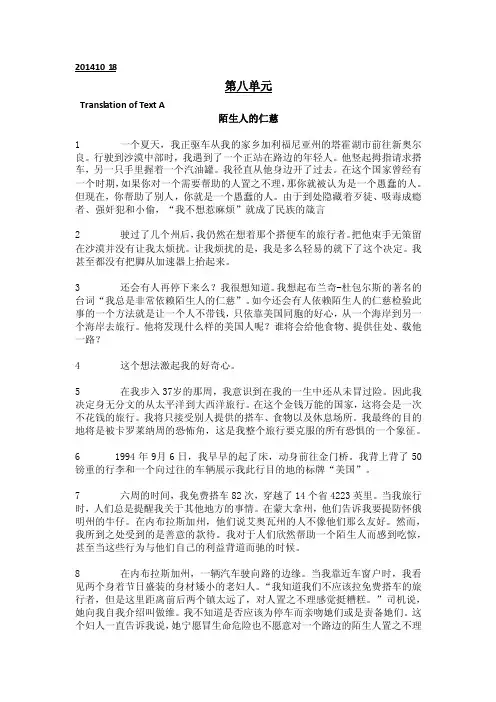
20141018第八单元Transla tion of Text A陌生人的仁慈1 一个夏天,我正驱车从我的家乡加利福尼亚州的塔霍湖市前往新奥尔良。
行驶到沙漠中部时,我遇到了一个正站在路边的年轻人。
他竖起拇指请求搭车,另一只手里握着一个汽油罐。
我径直从他身边开了过去。
在这个国家曾经有一个时期,如果你对一个需要帮助的人置之不理,那你就被认为是一个愚蠢的人。
但现在,你帮助了别人,你就是一个愚蠢的人。
由于到处隐藏着歹徒、吸毒成瘾者、强奸犯和小偷,“我不想惹麻烦”就成了民族的箴言2 驶过了几个州后,我仍然在想着那个搭便车的旅行者。
把他束手无策留在沙漠并没有让我太烦扰。
让我烦扰的是,我是多么轻易的就下了这个决定。
我甚至都没有把脚从加速器上抬起来。
3 还会有人再停下来么?我很想知道。
我想起布兰奇-杜包尔斯的著名的台词“我总是非常依赖陌生人的仁慈”。
如今还会有人依赖陌生人的仁慈检验此事的一个方法就是让一个人不带钱,只依靠美国同胞的好心,从一个海岸到另一个海岸去旅行。
他将发现什么样的美国人呢?谁将会给他食物、提供住处、载他一路?4 这个想法激起我的好奇心。
5 在我步入37岁的那周,我意识到在我的一生中还从未冒过险。
因此我决定身无分文的从太平洋到大西洋旅行。
在这个金钱万能的国家,这将会是一次不花钱的旅行。
我将只接受别人提供的搭车、食物以及休息场所。
我最终的目的地将是被卡罗莱纳周的恐怖角,这是我整个旅行要克服的所有恐惧的一个象征。
6 1994年9月6日,我早早的起了床,动身前往金门桥。
我背上背了50镑重的行李和一个向过往的车辆展示我此行目的地的标牌“美国”。
7 六周的时间,我免费搭车82次,穿越了14个省4223英里。
当我旅行时,人们总是提醒我关于其他地方的事情。
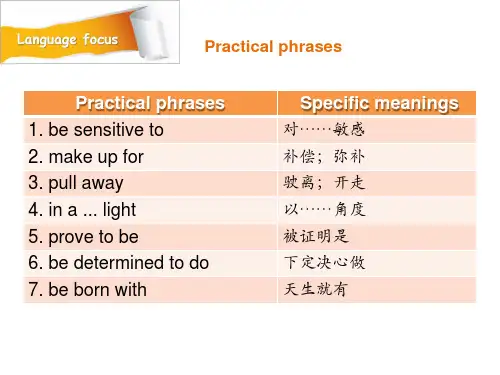
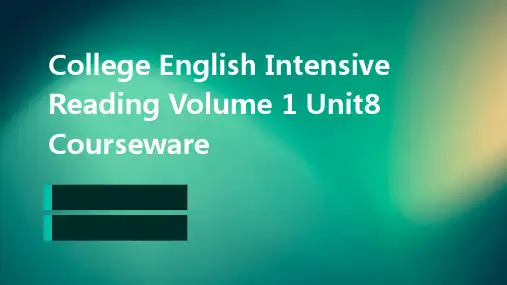

一、课题大学英语综合教程1 Unit 8二、教学目标1. 知识目标:(1)掌握本单元的核心词汇和短语;(2)理解并运用本单元的语法知识;(3)了解本单元的主题和背景知识。
2. 能力目标:(1)提高学生的阅读理解能力;(2)培养学生运用英语进行口头和书面表达的能力;(3)增强学生的跨文化交际意识。
3. 情感目标:(1)激发学生对英语学习的兴趣;(2)培养学生的团队协作精神;(3)引导学生树立正确的价值观。
三、教学重点与难点1. 教学重点:(1)词汇:掌握本单元的核心词汇和短语;(2)语法:理解并运用本单元的语法知识;(3)阅读理解:提高学生的阅读理解能力。
2. 教学难点:(1)词汇:正确运用词汇进行表达;(2)语法:灵活运用语法知识;(3)阅读理解:理解文章的主旨和大意,把握文章结构。
四、教学方法与手段1. 案例分析法:通过具体案例,引导学生理解词汇和语法知识;2. 讨论法:鼓励学生积极参与课堂讨论,提高学生的口语表达能力;3. 角色扮演法:通过角色扮演,提高学生的跨文化交际意识;4. 多媒体教学:利用多媒体资源,丰富课堂内容,提高学生的学习兴趣。
五、教学过程1. 导入新课(1)教师简要介绍本单元的主题和背景知识;(2)学生分享自己对主题的理解和感受。
2. 词汇教学(1)教师带领学生学习本单元的核心词汇和短语;(2)学生通过小组讨论,运用词汇进行表达;(3)教师纠正学生的错误,强调词汇的正确用法。
3. 语法教学(1)教师讲解本单元的语法知识,并通过例句进行演示;(2)学生进行语法练习,巩固所学知识;(3)教师点评学生的练习,纠正错误。
4. 阅读理解(1)教师讲解阅读理解的方法和技巧;(2)学生阅读课文,完成阅读理解练习;(3)教师点评学生的答案,引导学生深入理解文章内容。
5. 口语表达(1)教师组织学生进行角色扮演,提高学生的口语表达能力;(2)学生分组讨论,分享自己的观点和感受;(3)教师点评学生的口语表达,鼓励学生积极参与。
新视野大学英语1第三版读写教程答案Unit 8Section ALanguage focusWords in use31 sequence2 relief3 retreated4 restrain5 inevitably6 tendency7 deliberate8 process9 evident 10 rigidWords building4Words learned New words formed-lypresent presentlycost costlydead deadlyapproximately approximatename namelyscarcely scarcebarely bare-oreditor editgenerate generatorsurvivor survive51 approximate2 deadly3 presently4 costly5 generator6 bare7 survive8 editing9 namely 10 scarceBanked cloze61 O2 M3 N4 K5 J6 G7 A8 D9 E 10 BExpressions in use71 in…terms2 pulled away3 to…relief4 be born with5 in a new light6 on a mission7 in comparison 8 make up for 9 spilled out 10 At the timeStructured writing9College life and high school life differ in many ways. High school offers fundamental courses such as math, physics and English, whereas college offers more specialized courses, most of which are related to students’ majors. In high school, all classes a re arranged by the school, so students just follow a fixed schedule; in contrast, college students can choose the courses in which they are interested and arrange their own schedule, so their schedule is more flexible. Moreover, high school students acquir e knowledge and skills mainly through teacher’s instructions. In contrast, besides attending lectures, college students are expected to learn on their own, and develop critical thinking.Translation10作为世界上唯一一个真正具有普遍性的世界组织,联合国已经成为处理超越国界、而且任何一个国家都无法独立解决的问题的首要论坛。
Xingtai PoIytechn i c Co11ege教案课程名称新视野大学英语I学时2序号1授课班级见附录日期参考说明任课教师见附录课题Unit8Friendship across gender and border(读写教程)教学目标能力目标:To comprehend the differences between men's friendship and women's.了解男性之间的友谊和女性之间友谊的区别。
To learn to accept and respect different kinds of friendships in different cultures with an open mind.用开放的心态学会接受和尊重不同文化中各类友谊形式。
应用性知识目标:To listen and get the key words of the listening material.听听力材料,并抓关键词,理解听力内容。
To get the ability of expressing oneself by using comparison and contrast pattern.能够运用对比和类比陈述自己观点。
To learn to use metaphors to make one's statements vivid.学会运用比喻等手法使陈述形象化。
训练项目(任务)Develop the listening and speaking skills:work in pairs and discuss 听力和口语技能训练教学媒体准备新视野读写教程1光盘新视野读写教程1—unit8课件第1页(共3页)教案教学过程教学活动步骤及时间安排:◊Review and question:dictate the key words and expressions in unit7(10 min)复习提问O Lead-in and listening training:What's friendship?Is there any difference between men's friendship and women's(10min)导入与听力◊ Overview of the text and text structure(30min)课文概述及结构分析◊ New words(30min)词汇◊ Exercises and conclusion(20min)课内练习及总结第2页教案教学过程板书设计:Text Structure课文结构Part I(Paragraph1):It introduces the author's different pictures of his female friends and male friends.Part II(Paragraph2-4):It provides two examples to illustrate how differently the author communicates with his male and female friends.Part III(Paragraph5-6):It discusses about gender differences in friendship and their causes.Language points语言点In...terms:used to show what aspect of a subjectIn comparison:talking about the ways in which two things are differentMake up for:do sth that corrects a bad situationOn a mission:performing a service or carry on an activityIn a...light:from a...aspectLook sb in the eye:look directly at sb when you are speaking to themTo sb's relief:with a feeling of comfort after fright,worry or pain作业:Finish exercises on P213and P216.完成语言点练习板块课后总结第3页Xingtai PoIytechn i c Co11ege教案课程名称新视野大学英语I学时2序号2授课班级见附录日期参考说明任课教师见附录课题Unit8Friendship across gender and border(读写教程)教学目标能力目标:Develop the language skills:the suffix-ly and-or.语言技巧:后缀J y和-" Learn the writing skills of contrast写作技巧:对比应用性知识目标:Master the different forms of suffixes:-ly and-or掌握后缀和-or Learn the writing skills of contrast写作技巧:对比.训练项目(任务)Develop the writing skills of contrast on page218写作技巧训练:对比. Develop the translation skill:translate a paragraph of time order.翻译技巧训练教学媒体准备新视野读写教程1光盘新视野读写教程1—unit8课件第1页(共3页)教案教学过程教学活动步骤及时间安排:◊Review activity:retell the main idea of text A(5min)复习◊Word-building:the suffixes of-ly and-or构词法◊ Language focus(20min)词汇练习◊Translation skills practice(25min)翻译技巧训练◊Writing skills practice(30min)写作技巧训练◊ Self-assessment(10min)自我评测第2页教案教学过程板书设计:Word-building:the suffixes of-ly and-orNoun+ly一adjectiveAdjective+ly一adverbVerb+or一nounTranslation skills and practiceTranslate the following paragraphsThe United Nations(English一Chinese)中国外交政策(Chinese—English)Writing skills and practice Topic!Topic sentence!Details of contrast!Summary or conclusion作业:Preview Section B.预习Section B课后总结第3页Xingtai PoIytechn i c Co11ege教案课程名称新视野大学英语I学时2序号3授课班级见附录日期参考说明任课教师见附录课题Unit8Friendship across gender and border(读写教程)教学目标能力目标:Set an open mind to the outside world.开放的心态Reading skills:grasp the main idea1翔读技巧:抓主题句应用性知识目标:Master the key language points in the text;掌握关键语言/也Master the reading skill.掌握阅读技巧训练项目(任务)Develop the reading skill:grasp the main idea 阅读技巧训练教学媒体准备新视野读写教程1光盘新视野读写教程1—unit8课件第1页(共3页)教案教学活动步骤及时间安排:◊Review activity:words dictation of Section A(10min)复习教学◊ Pre-reading activity:Pick out the main idea of each paragraph(10min)®读准备◊ Overview of Text B and text structure(10min)课文概述及结构分析◊Text reading(20min)课文阅读◊Text study(30min)课文讲解过程◊Exercises(20min)课文大意总结及复述◊Exercises(15min)课内练习第2页教案板书设计:Reading skills:grasp the main idea1.What is the subject of the paragraph?2.What is the purpose of discussing the subject?Is the purpose to inform,explain,discuss,define,defend or criticize the subject?3.What idea is the author trying to convey about the subject?State the main idea in each paragraph of Text B教学Para1:Para2:过程Para3:Para4:Para5:Para6:作业:Finish the reading comprehension P227.完成阅读练习板块Finish the language focus and structure P228-229.完成词汇、结构练习板块课后总结第3页Xingtai PoIytechn i c Co11ege教案课程名称新视野大学英语I学时2序号4授课班级见附录日期参考说明任课教师见附录课题Unit8Friendship across gender and border(读写教程)教学目标能力目标:Develop the language skills:collocation语言技巧应用性知识目标:Master the key language points in the text;掌握关键语言/也Grasp the collocation about the word aa friendship,\掌握“friendship"的搭配训练项目(任务)Unit project:Conduct a debate on cross-gender friendship课堂讨论教学媒体准备新视野大学英语I光盘新视野大学英语I-unit8课件第1页(共3页)教案教学活动步骤及时间安排:◊Review activity:review the key word and expressions in Text B(10min)复习提问◊Language focus and sentence structure(40min)词汇练习◊Collocation skills practice(30min)搭配技巧训练◊Group debate on cross-gender friendship(10min)课堂口语训|练教学◊Self-assessment(5min)自我评测J过程◊Summary(5min)小结第2页教案教学过程板书设计:Unit project―Cross-gender friendship is possible or notStep1:In-class debate:support or oppose the idea.Step2:Do research and collect supporting materials(at least4items)for your idea after class.Step3:State your ideas in the next class.作业:Review the whole book and prepare for the final exam.复习,准备考试。
大学英语精读第一册08大耳朵英语 2005-09-30 00:28:47 【打印】Unit EightClick the button to listen to the textA young boy faces the impossible task of trying tosoften the blow of tragic news.YOU GO YOUR WAY, I'LL GO MINEThe messenger got off his bicycle in front of the house of Mrs. Rosa Sandoval. He went to the door and knocked gently. He knew almost imme- diately that someone was inside the house. He could not hear anything, but he was sure the knock was bringing someone to the door and he was most eager to see who this person would be--this woman named Rosa Sandoval who was now to hear of murder in the world and to feel it in herself. The door was not a long time opening, but there was no hurry in the way it moved on its hinges. The movement of the door was as if, whoever she was, she had nothing in the world to fear. Then the door was open,and there she was.To Homer the Mexican woman was beautiful. He could see thatshe had been patient all her life, so that now, after years of it,her lips were set in a gentle and saintly smile. But like allpeople who never receive telegrams the appearance of a messenger atthe front door is full of terrible implications. Homer knew thatMrs. Rosa Sandoval was shocked to see him . Her first wordwas the first word of all surprise. She said" Oh," as if instead of a messen- ger she had thought of opening the door to someone she had known a long time and would be pleased to sit down with. Before she spoke again she studied Homer's eyes and Homer knew that she knew the message was nota welcome one."You have a telegram?" she said.It wasn't Homer's fault. His work was to deliver telegrams. Even so ,it seemed to him that he was part of the whole mistake. He felt awkward and almost as if he alone were responsible for what had happened. At the same time he wanted to come right out and say, "I'm only a messenger, Mrs. Sandoval. I'm very sorry I must bring you a telegram like this, but it is only because it is my work to do so. ""Who is it for?" the Mexican woman said."Mrs. Rosa Sandoval, 1129 G Street," Homer said. He extended the telegram to the Mexican woman, but she would not touch it."Are you Mrs. Sandoval?" Homer said."Please," the woman said. " Please come in. I cannot read English. Iam Mexican. I read only La Prensa which comes from Mexico City." She paused a moment and looked at the boy standing awkwardly as near thedoor as he could be and still be inside the house."Please, " she said, "what does the telegram say?""Mrs. Sandoval, " the messenger said, "the telegram says-"But now the woman interrupted him. " But you must open the tele-45 gram and read it to me, " she said. " You have not opened it. " "Yes, ma' am, " Homer said as if he were speaking to a school teacherwho had just corrected him.He opened the telegram with nervous fingers. The Mexican womanstooped to pick up the torn envelope, and tried to smooth it out. As she did so she said, "Who sent the telegram - my son Juan Domingo?""No, ma' am. " Homer said. "The telegram is from the War Depart-ment. ""War Department?" the Mexican woman said."Mrs. Sandoval," Homer said swiftly, "your son is dead. Maybe it's a mistake. Everybody makes a mistake, Mrs. Sandoval. Maybe it wasn'tyour son Maybe it was somebody else. The telegram says it was Juan Domingo. But maybe the telegram is wrong."The Mexican woman pretended not to hear."Oh, do not be afraid," she said. "Come inside. Come inside. I will60 bring you candy." She took the boy's arm and brought him to the table at the center of the room and there she made him sit."All boys like candy," she said. "I will bring you candy." She wentinto another room and soon returned with an old chocolate candy box. She opened the box at the table and in it Homer saw a strange kind of candy."Here, " she said. "Eat this candy. All boys like candy. "Homer took a piece of the candy from the box, put it into his mouth,and tried to chew."You would not bring me a bad telegram, " she said. "You are a goodboy--like my little Juanito when he was a little boy. Eat another piece." And she made the messenger take another piece of the candy.Homer sat chewing the dry candy while the Mexican woman talked."It is our own candy," she said, "from cactus. I made it for my Juanito when he come home, but you eat it. You are my boy, too. "Now suddenly she began to sob, holding herself in as if weeping were a disgrace. Homer wanted to get up and run, but he knew he would stay. He even thought he might stay the rest of his life. He just didn't know what else to do to try to make the woman less unhappy ,and if she had asked him to take the place of her son, he would not have been able to refuse, because he would not have known how. He got to his feet, as if by standing he meant to begin correcting what could not be corrected and then he knew the foolishness of this intention and became more awkward than ever. In his heart he was saying over and over again, "What can I do? What the hell can I do? I'm only the messenger. "Click the button to listen to the pronunciations of new wordsNew Wordssoften v.(cause to) become soft (er) or gentle(使)软化; (使)温和tragic a.very sad, unfortunate;of or relatedto tragedy 悲惨的;悲剧的messenger n.a person employed to deliver telegrams, letters or parcels 送信人;电报投递员gently ad.softly 轻轻地immediately ad.at onceimmediate a.eager a.marked by strong interest or impatient desire 热切的,渴望的hinge n.铰链whoever pron.no matter who 无论谁,不管谁saintly a.like a saint; very holy 像圣徒一样的;圣洁的implication n.含义imply vt.shock vt.cause unpleasant or angry surprise to (sb.) 使(某人)震惊deliver vt.take (sth.) to the place where it must go 交付,递送awkward a.uncomfortable 尴尬的Mexican n. &a.墨西哥人;墨西哥(人)的pause vi.stop for a short time 暂停,中止interrupt vt.stop (sb. speaking) by breaking in 打断(某人讲话)nervous a.神经质的;紧张的ma'ammadam ( used in direct address )夫人,太太,小姐mooth vt.make smooth or smoother 把...弄平department n.部门;系swiftly ad.rapidly, quickly 快速的;敏捷地swift a.chocolate n.巧克力(糖)chew vt.crush (food) with the teethcactus n.仙人掌 ?sob vi.cry with short, quick breaths 啜泣;呜咽disgrace n.shame 耻辱;丢脸的人(或事)unhappy a.not happyhell n.地狱Phrases & Expressionshear ofhave knowledge of or receive information about 听到,听说be responsible forbe the cause of 应对...负责的come out (with)speak out 大声的说,清楚的说smooth outmake smooth(er)hold oneself incontrol one's feelingstake the place ofact or be used instead of , replace 代替,取代get to one's feetstand upover and over againvery often, repeatedly 反复地,再三地Proper NamesRosa Sandoval罗莎.桑多瓦尔Homer霍默Mexica City墨西哥城(墨西哥首都)Juan Domingo胡安.多明哥the War Department(美国)陆军部(旧称)Juanito胡安尼特(Juan的呢称)。